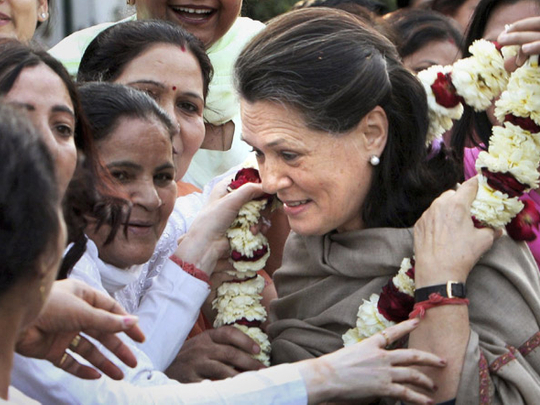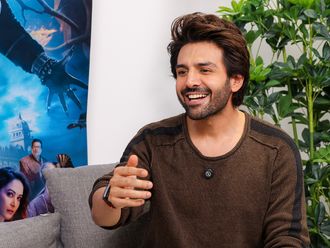
New Delhi: Spanish writer Javier Moro's book The Red Sari has worked as a red rag for the Congress Party. Already a bestseller in Spanish and Italian, the English version of El Sari Rojo (The Red Sari: When Life is The Price of Power) is due for release in India soon. But lawyers and leaders of the Congress Party have slapped a legal notice on the author of the "fictionalised biography" of Congress President Sonia Gandhi. They are all set to ban the book in India.
Moro claims the book glorifies the Gandhi family and defends its ideals, but the Congressmen will have none of it. This had led the writer to hope that, "Some clever guys with common sense will be able to see that this book is a boon for the Gandhi, the party, and especially for Sonia."
The book is the result of a three-year research on the life of Sonia during which time the author traced her friends and relatives to get an authentic picture of the life of the most powerful woman in India. Since the book is yet to be released, Moro is miffed with Congress watchdogs, who he says, have taken out lines out of context and are manipulating the text.
The author speaks to Gulf News from Madrid, Spain, in an exclusive interview and gives vent to his hurt feelings.
GULF NEWS: You have decided to carry a disclaimer in the new editions of your book The Red Sari, claiming that the dialogues and situations therein are the product of the author's interpretation. Is it an afterthought?
JAVIER MORO: No, it is an imposition by Sonia Gandhi's attorney Abhishek Manu Singhvi.
Singhvi says you have backtracked on an agreement. What was the agreement?
It was an agreement on the disclaimer. The problem is that, once we got this agreement on the disclaimer, he kept piling up demands that had nothing to do with the disclaimer. Like inserting a leaflet in every book of the first edition in every bookstore with the disclaimer, or forcing every publisher to pay a full page advertisement in a major newspaper to publish the disclaimer and the obligation that a movie will not be made based on the book. These demands were impossible to meet. That made me think he was not really interested in the disclaimer per se.
Was the agreement verbal or were things discussed and put on paper, officially?
It was an exchange of emails that lasted for more than six months. Everything is on paper.
Despite being a foreigner, you have written about Sonia's feelings for India and her Indianness with such efficacy. Are these interpretations your own?
Yes, I have dramatised Sonia's life. As any scriptwriter would have done, had a film been made on her.
Had you sought an audience with Sonia before or at the time of writing the book? Who was the mediator?
I tried many times to get an audience with Mrs Gandhi, during and after the research. The mediator was Suman Dubey [a trusted family friend of the Gandhis]. I know he tried his best, but to no avail.
Do you think she would have been much more reasonable had you both met?
At this point, I think it is better that we did not meet. Because I could not have written the book with the liberty I had. The extracts [from the book] portray Sonia in good light. After the controversy, you've mentioned that the intention of some people is to harm the family's ideals.
I have portrayed Sonia in the light she deserves. Her life is an inspiration for people all over the world. Thanks to her involvement in politics, old demons of communal hatred have vanished —at least for the time being. The ideals she represents are ideals of secularism, democracy and modernity. These are also the ideals of the first Prime Minister of India Jawaharlal Nehru. And I also share these ideals. This is why I cannot understand the irrationality of this whole controversy.
The guys that have burned pages of my book and a photograph of myself in the streets of Delhi must have been sent by a high level Congressman. There was even a photographer present. Don't they realise this is bad for the image of India and bad for the image of the Congress Party?
The interesting debate about The Red Sari could have been about the limits between fiction and non-fiction. But instead, we are thrown back into archaic India, into a dark age of inquisition.
While writing the book, did you from time-to-time share the contents with anyone?
I shared the contents of my book with university professors specialised in India, like the eminent Professor Michelguglielmo Torri of the University of Torino.
Is it because the book is termed a ‘fictionalised biography', it has created a storm. Can the storm be settled by terming it a ‘fictionalised novel' ?
That is what the disclaimer says. In fact, it is a dramatised account of the Gandhi family and Sonia.
Is it a tendency among Indians to comment on works without properly reading the books? [The recent case was that of Bharatiya Janata Party leader Jaswant Singh's book].
I think that kind of reaction is irrational. By writing about Sonia, I have in some way ‘desacralised' her, and they [Congressmen] cannot stand it, because they see her as a deity. The simple fact of writing about her, of showing her as a human being, is unacceptable to some party loyalists. As if I was trying to kill the myth. It becomes almost a ‘religious' matter. Singhvi has used the word ‘devil' referring to me in one of the interviews. This is what the whole controversy is about: the devil against the goddess! We are in the realm of mythology, not of reality.
What do you plan to do now?
I will do nothing, except defend myself if need be.
Profile: From studying history to writing novels
- Javier Moro was born on February 11, 1955 in Madrid to Julio Moro and Bernadette Lapierre.
- Studied history in Madrid and Paris.
- His first job was as a researcher with Dominique Lapierre and Larry Collins.
- He wrote his first movie at the age of 20. Named Valentina, it was based on a famous Spanish novel.
- Lived for five years in Los Angeles where he worked with directors such as Ridley Scott.
- He co-wrote a television series on Mother Teresa.
- His last book, Passion India, has been translated into 22 languages and has sold more than 1.5 million copies.
- His other titles include The Jaipur Foot, The Mountains of the Buddha and Five Past Midnight in Bhopal with Dominique Lapierre.
- He is married to Madrid-born Sita (not an Indian).
- The couple have a six-year-old boy and a three-year-old daughter.
- The family lives between Madrid and the island of Ibiza.













